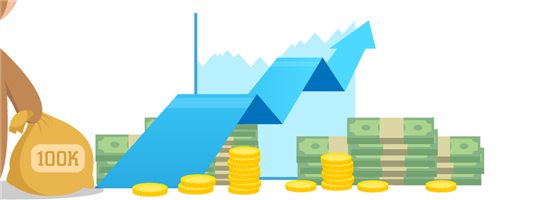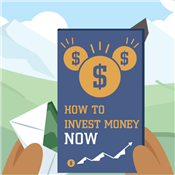How to Invest $100k in 2023: 5 Best Ways
Ad Disclosure: This article contains references to products from our partners. We may receive compensation if you apply or shop through links in our content. This compensation may impact how and where products appear on this site. You help support CreditDonkey by using our links.
Investing large sums of money in a savings account or CD? That mistake may be costing you. Find better ways to invest $100K and increase your profits.
 |
| © CreditDonkey |
If you have $100,000 to invest, that's great! With that amount, you have a lot of options open.
Even if you aren't an experienced investor, there are ways to turn it into more without taking big risks.
Before you invest your $100K, make sure you're in a good financial place. Let's assume you already have an emergency fund with 3-6 months worth of expenses.
Next, consider any debt you need to eliminate. If you have credit card debt or student loans, use that $100k to pay them off so you're debt-free.
If you're good to go on both, then read on to learn the best ways to invest $100,000.
- Max Out Your Retirement Accounts
- Invest in Stocks
- Invest in Real Estate
- Peer-to-Peer Lending
- Start a Business
- Invest in a Business
- Best Way to Safely Invest $100K
- How to Invest $100K to Make $1 Million
- Should You Hire a Financial Advisor?
Your threshold for risk will help determine where you should invest your $100K.
- If you want to keep it safe, consider high-yield savings, CDs, treasury bonds, and money market funds.
While you won't get rich from these, they carry a lower risk of loss than other investment options.
- If you have average risk tolerance, consider blue chip stocks, index funds, and peer-to-peer lending.
- If you are willing to take a higher risk, you can include riskier investments like real estate, IPOs, cryptocurrencies, and angel investing.
Max Out Your Retirement Accounts
With $100,000, you can seriously pad your retirement nest egg and set yourself up for a better future.
If your work offers an employer-sponsored retirement plan (like a 401k), max out your contribution. The maximum 401(k) contribution is $22,500 per year. Another benefit is that your contributions are tax-deductible, so you also pay less income tax.
Check with your HR department and change your contribution to the maximum. This will reduce your monthly paycheck, but you've got $100,000 to make up for that.
If you also have an IRA (Individual Retirement Account), max that out too. If you don't have one, open an account now. This allows you to supplement your retirement savings and you get further tax benefits. The maximum contribution limit in an IRA is $6,500.
We recommend a Roth IRA. With a Roth IRA, your contributions are made with after-tax dollars, but your earnings grow tax-free. The best part is that you pay no taxes when you withdraw upon retirement.
Invest in Stocks
With smart investments, the stock market can give you the highest returns on your money. The average annual return of the S&P 500 index has been around 8%.
Here are some ways you can invest in stocks:
- Robo-advisor
If you're not sure how to invest your money, let a robo-advisor do the work for you. It'll pick investments for you based on your risk tolerance and goals. It also manages your portfolio so you can be completely hands-off.Read more to learn if a robo-advisor is right for you.
- Individual stocks
Picking your own stocks could give you a better chance at higher returns. But make sure to do your research carefully. It's recommended to have 15-20 stocks for diversification. It's best to pick stocks you can buy and hold for the long term.You'll need to open a brokerage account where you can make trades. See our list of the top free stock trading apps.
- ETFs
This option is a happy medium between robo and DIY. Exchange traded funds (ETFs) are baskets containing hundreds of stocks. This way, you get instant diversification with one single investment. For example, a S&P 500 ETF invests in the 500 largest companies in America.You can buy ETFs with any brokerage. They're traded just like stocks on the open market.
- Mutual funds
Mutual funds are similar to ETFs, but they're not listed on the open market. They are actively managed by an investment company, so the operational fee is usually higher.You can purchase mutual funds from certain brokerages, or directly from mutual fund companies like Vanguard and Fidelity.
Invest in Real Estate
Real estate is a popular way to invest for income. With $100K, you can purchase (or make a decent down payment) a rental property. You can offset the mortgage payments with rental income. This is a great way to get some decent cash flow.
- Roofstock: Roofstock is a marketplace that easily lets you buy a property online. There are plenty of single-family homes for less than $100,000. You can buy a house already with tenants and immediately start earning rental income.
Real estate is a great investment, as historically it has seen higher returns compared to the stock market. If push came to shove, you could sell the property and accept the equity as your profits.
- Fundrise: Fundrise has commercial and residential properties all across the nation. It offers both income and growth portfolio options according to your goals. Dividends are paid quarterly.
Invest in Real Estate with $10+
- Only $10 minimum investment
- Get a diversified portfolio of real estate projects across the US
- Open to all investors
If managing a property isn't your thing, consider real estate crowdfunding. This allows you to pool funds with other investors to purchase real estate. A few popular options include:
- Realty Mogul: At Realty Mogul, investors can invest in equity or debt investments. Debt investments pay interest regularly, while equity investments must wait until maturity to receive payment.
RealtyMogul: Generate Passive Income
Peer-to-Peer Lending
Peer-to-peer lending is another good investment option with potential for good returns. This is when you lend money to individuals who need a loan. Instead of getting one from the bank, lenders like you provide the funds.
Note that there is the risk that a borrower won't pay back the loan. You can lower the risk through diversification by investing in multiple loans. With $100K, you can invest in a lot of different people.
Start a Business
Want to be your own boss? If you have a great idea, $100K can go a long way in jumpstarting your own business.
This gives you the capital for start-up costs like business filing fees, equipment, inventory, and office space.
Even more valuable is the help you can get. No one person can know all aspects of starting a business. With that amount of money, you can seek advice, take classes, and hire professionals (like a web designer, lawyer, marketer, etc).
But before you quit your day job, make sure you have a solid business plan. Take time to research your industry, assess risks, and create an action plan. With proper planning, you have better chances of turning your start-up into a success.
Whether you go back to college, pay for additional training, or take an unpaid internship while living off the $100,000, there's value in bettering yourself.
Invest in a Business
If you don't want to actively handle your own company, you can invest in someone else's business.
Angel investing is done through equity crowdfunding platforms, such as Wefunder and SeedInvest. This means that you will actually own a piece of the company. The size of your share will depend on how much funding you provide.
This is usually a very long-term investment. You earn returns when the company is acquired or goes public (if it ever does). Or the business could have a dividend agreement that pays investors a share of the profits.
But note that this is a high-risk investment because startups are more likely to fail. But the potential return can be higher too. Search for businesses you want to invest in and be sure you understand the terms.
Best Way to Safely Invest $100K
If you would rather not risk your $100K or you need it in an account you can liquidate quickly, then it's best to save in a bank account or other low-risk investments.
CIT Bank Platinum Savings - $300 Bonus
- Transfer a one-time deposit of $50,000+ for a Bonus of $300
- 4.10% APY with a balance of $5,000 or more
- 0.25% APY with a balance of less than $5,000
- No monthly maintenance fee
- Member FDIC
Discover® Online Savings - $200 Cash Bonus
To qualify for Bonus: Apply for your first Discover Online Savings Account, enter Offer Code CY325 at application, deposit into your Account a total of at least $15,000 to earn a $150 Bonus or deposit a total of at least $25,000 to earn a $200 Bonus. Qualifying deposit(s) may consist of multiple deposits and must post to Account within 45 days of account open date. Maximum bonus eligibility is $200.
What to know: Offer not valid for existing or prior Discover savings customers. Eligibility is based on primary account owner. Account must be open when bonus is credited. Bonus will be credited to the account within 60 days of qualifying for the bonus. Bonus is subject to tax reporting. Offer ends 09/11/2025, 11:59 PM ET. Offer may be modified or withdrawn without notice. Due to new customer funding limits, you may wish to initiate fund transfers at your other institution. For information on funding, see FAQs on Discover.com/Bank. See advertiser website for full details.
High Yield Savings Account - 4.25% APY
- No fees
- $1 minimum deposit
- 24/7 online access
- FDIC insured
You can grow your money more with an online bank rather than your local bank. Online banks have less overhead so they can offer higher interest rates. A few popular options include:
- Synchrony Bank: Synchrony offers savings, CDs, and money market accounts, as well as IRA CDs and money markets.
- Ally Bank: Ally is a full-service online bank offering interest checking, high-yield savings, money market accounts, and CDs.
If you choose to invest some or all of your money in CDs, make sure you pay close attention to the maturity date. You agree to tie up your money for a specific period with this savings vehicle.
While you may be able to end the CD prematurely, it could cost you as much as 90 days of interest as a penalty.
How to Invest $100K to Make $1 Million
If you're dreaming a lot bigger than your current $100K, you aren't alone. $100K can turn into $1 million with patience and smart investments.
We always recommend that you focus on long-term wealth building, instead of turning a quick buck. This gives you better chances of success.
It's natural for the stock market to go up and down. If you're in it for the long haul, you'll have time to ride out the fluctuations of the market. If you're too focused on instant gains, you may make impulsive decisions that lead to poor results.
You can play around with numbers yourself on this compound interest calculator.
It's also important to diversify your investments. This way, if something doesn't do well, the downturn may be offset by another successful investment.
Think about your risk tolerance and plan a strategy that you're comfortable with. You can spread your $100,000 out between stocks, bonds, real estate, savings, etc.
Should You Hire a Financial Advisor?
If you really have no interest in managing your own investments, you could get a financial advisor. Usually, the minimum to take on a client is $100K.
A financial planner will create an investment strategy for you based on your goals and current situation. So there's more customization than a robo-advisor. But the management fee is higher too.
Empower is a hybrid robo and human advisory service. It designs a personalized investment strategy for you at less cost than traditional financial planners. The minimum is $100,000.
What the Experts Say
CreditDonkey asked a panel of industry experts to answer readers' most pressing questions. Here's what they said:
Bottom Line
Every investor will chart their own course for investing $100K. Before you invest, do some soul searching:
- What type of investor are you?
- What type of risk can you take?
- Can you stand to lose it all or do you need to be a bit more conservative?
Once you have these answers, you can make investment choices that are right for you.
Write to Kim P at feedback@creditdonkey.com. Follow us on Twitter and Facebook for our latest posts.
Note: This website is made possible through financial relationships with some of the products and services mentioned on this site. We may receive compensation if you shop through links in our content. You do not have to use our links, but you help support CreditDonkey if you do.
Fundrise, LLC ("Fundrise") compensates CreditDonkey Inc for new leads. CreditDonkey Inc is not an investment client of Fundrise.
Empower Personal Wealth, LLC (“EPW”) compensates CREDITDONKEY INC for new leads. CREDITDONKEY INC is not an investment client of Personal Capital Advisors Corporation or Empower Advisory Group, LLC.
|
|
|













